Ramadan Holidays in the UAE: A Cultural Insight
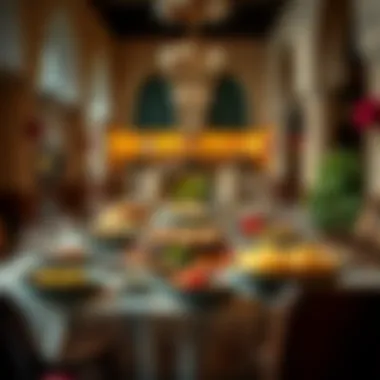
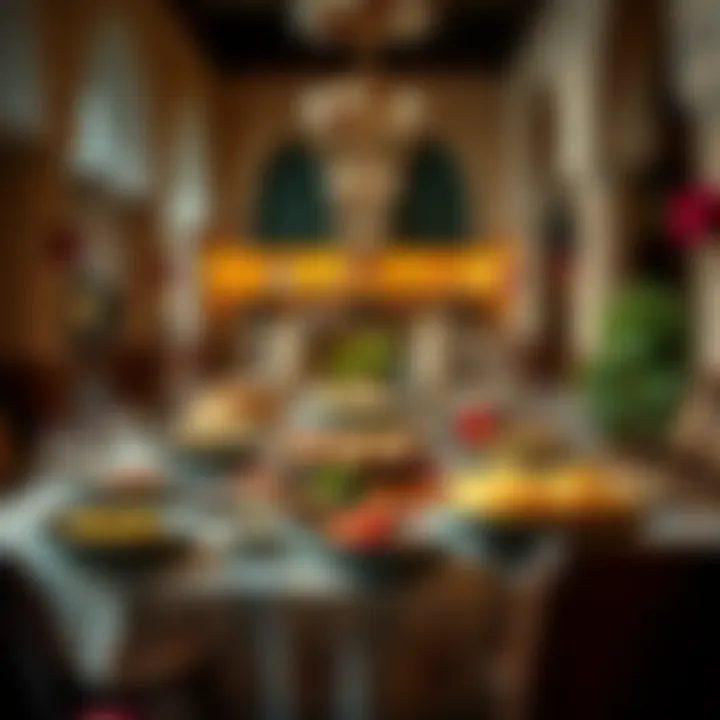
Intro
Ramadan, the ninth month of the Islamic lunar calendar, is more than just a period of fasting for Muslims. In the United Arab Emirates, this time of year takes on a distinctive hue, shaped by a rich tapestry of cultural practices and communal traditions. From bustling markets to serene mosques, the essence of Ramadan echoes with spirituality and shared experiences that forge strong community bonds.
The significance of Ramadan extends well beyond personal reflection and piety. It serves as a touchstone for understanding the broader cultural and economic dynamics at play within the UAE. As the days grow longer and the sun shines fiercely, communities gear up for varied observances marked by both solemnity and joy. The month acts not only as a time for introspection but also influences the social landscape, fostering an environment ripe for hospitality and celebration.
The interactions among diverse expatriate communities further enrich the Ramadan experience. Festive Iftar gatherings bring together friends, families, and even strangers, reinforcing the value of unity and compassion. As the sun dips below the horizon, tables laden with an array of traditional dishes come alive, showcasing culinary heritage that blends time-honored recipes with contemporary touches.
Beyond social dynamics, the impact of Ramadan on the UAE's economy is noteworthy. The hospitality sector buzzes with activity, as restaurants, hotels, and cafes craft special menus to cater to the appetites of those breaking their fast. Moreover, real estate markets witness unique trends fueled by lifestyle changes, as people seek family-friendly environments conducive to shared celebrations.
This article takes a detailed look at the various nuances of Ramadan in the UAE. Through our exploration, we aim to illuminate how the holiday reflects deeper values and traditions while enlightening stakeholders—such as investors, agents, and homebuyers—on the unique opportunities that arise during this multifaceted month.
Understanding Ramadan in the UAE
Understanding Ramadan in the UAE holds immense significance, as this month is a cornerstone of the cultural and spiritual identity of Emirati society. It isn’t merely a time for fasting; it’s a period steeped in tradition, reflection, and communal harmony. By exploring the intricate layers of Ramadan, one can garner insights into the values embraced by Emiratis and how these values manifest in various aspects of daily life.
Historical Context of Ramadan
Ramadan’s roots go back to the dawn of Islam, providing a historical tapestry that weaves together deep religious significance and social traditions. The history of Ramadan is intimately linked to the Qur'an, which was believed to have been revealed during this month. In the UAE, where tradition bears weight, the observance of this holy month has transcended generations. Throughout history, the residents of the Emirates have adapted various practices of Ramadan, blending local customs with the fundamental Islamic teachings.
As centuries passed, Ramadan began to acquire a more pronounced communal aspect. Festivals evolved, and the breaking of fast transformed from a solitary act into a grand affair filled with rich cultural practices. Families would gather, communities would come together, and even influences from neighboring cultures and trade routes shaped how Ramadan was celebrated. This historical intertwining has crafted a unique flavor of Ramadan in the UAE that harmoniously balances its Islamic heritage with local customs.
Cultural Significance of Ramadan
The cultural significance of Ramadan in the UAE cannot be overstated. It is a time marked by an unmistakable aura of compassion, generosity, and unity. Throughout the month, one sees a remarkable shift in societal conduct, where individuals focus not only on spiritual reflection but also on building bridges with the community.
Ramadan serves as a reminder of the values of charity and empathy.
- Acts of generosity become rampant; with many engaging in charitable activities like donating to food banks or providing meals to the less fortunate.
- Community gatherings for Iftar are celebrated not just among families but also extend to friends and neighbors, fostering a sense of belonging.
- Hospitality flourishes as homes open to family gatherings and Public Iftar events are held to encourage shared meals.
More than just abstaining from food, Ramadan is an opportunity to unite as a society, express gratitude, and emphasize the importance of contributing to the wellbeing of others. It reinforces social ties, making it a vital period in the cultural calendar of the UAE. All these factors contribute to making Ramadan a profound experience that resonates with both the heart and mind of the Emirati people.
Official Holidays During Ramadan
Understanding the official holidays during Ramadan is crucial for both residents and visitors in the UAE. This period isn’t just about fasting; it’s intertwined with observances that hold significant cultural and economic importance. As a pivotal part of life in the UAE, these holidays impact various sectors including hospitality, retail, and tourism. Knowing the public holiday schedule helps businesses, employees, and families to plan accordingly, allowing a harmonious blend of work and spiritual observance.
Public Holiday Schedule
The public holiday schedule in the UAE during Ramadan usually varies each year depending on the lunar calendar. Generally, government entities and private companies observe a few key days as public holidays. For instance, the Eid al-Fitr holiday marks the end of Ramadan and is a time for celebration. The UAE cabinet announces the official dates closer to the holiday, allowing some flexibility, which can be quite beneficial for business operations and travel plans.
It’s imperative for employers and employees alike to stay informed about these dates to avoid any confusion. In 2023, for example, the Eid al-Fitr holiday was declared from April 21 to April 24. This gives many workers a long weekend to travel or spend quality time with family, reflecting the holiday's importance.
Variability of Dates
The variability of dates during Ramadan is primarily due to the reliance on the Islamic lunar calendar, making it essential to take note of the moon sighting. The beginning and end of Ramadan can shift based on regional customs and observations. This variability can present challenges and opportunities for businesses and communities, affecting planning in several ways.
For international investors and businesses, understanding these fluctuations can aid in aligning strategies effectively. For example, hotel industries often prepare for increased demand leading up to Eid al-Fitr, suggesting that a knowledge of the holiday’s timing can be financially advantageous.
Additionally, tourists planning to visit the UAE during Ramadan should also consider these variable dates to maximize their experiences. For example, reservations for Iftar dinners, which are special meals to break the fast, are highly sought after during this time and fill up quickly.
"The observances surrounding Ramadan reveal the UAE’s rich cultural tapestry, with public holidays acting as opportunities for communal bonding and economic activity."
Daily Life During Ramadan
Ramadan is much more than a mere month of fasting; it is a profound period that shapes daily life in the UAE. The holy month encourages spiritual introspection, reflection, and a sense of community. With the dawn-to-dusk fasting comes the transformation of routines, rituals, and interpersonal connections, making it a unique period that impacts not only individuals but also families and society as a whole.
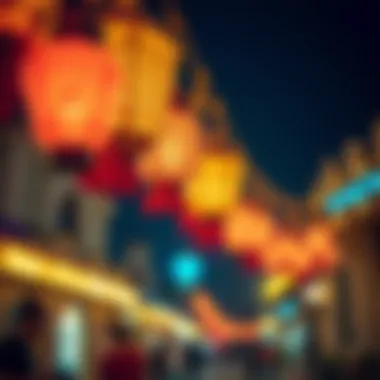

Changes to Daily Routines
When Ramadan rolls around, the shift in daily habits can be striking. Many people adjust their sleeping patterns to accommodate pre-dawn meals (suhoor) and evening meals (iftar). In bustling cities like Dubai and Abu Dhabi, the early morning hours see families gathering for suhoor, and shops and restaurants often have altered hours to observe the fasting schedule.
- Morning Shifts: Many workplaces allow flexible hours, with employees starting later to adapt to the late-night atmosphere.
- Cultural Practices: There's a palpable change in the air, as mosques are busier, and spontaneous gatherings become more frequent.
This adaptation isn't just about individual convenience; it's a reflection of the larger social and cultural fabric of the UAE. The ethos of sharing and caring permeates everyday life during this holy month.
Iftar and Suhoor Traditions
Breaking the fast is an integral part of Ramadan. Iftar, the meal that breaks the fast, is often a community affair. Families and friends come together to enjoy an array of delectable dishes, with traditional dishes like biryani, samosas, and dates making regular appearances on the dining table.
Suhoor, on the other hand, is about starting the day right. It typically includes nourishing foods, aimed at sustaining individuals through the day of fasting that lies ahead. The shared experience of both meals fosters a deeper sense of connection among family and friends.
"There’s a warmth in the air during iftar gatherings, a bond created not just by food but by shared laughter and connection."
- Culinary Diversity: The kitchens buzz with a mix of culinary traditions, with influences coming from across the Arab world and beyond. Explore flavors from regions like Levantine, Persian, and Indian cuisines.
- Community Spirit: Many organizations hold large communal iftar events to ensure that everyone can share in the breaking of the fast, reinforcing social cohesion.
In summary, daily life during Ramadan in the UAE is marked by significant changes that reflect deeper communal values and culinary traditions. These customs serve to enhance the spiritual significance of this month, promoting unity, charity, and a richer connection among individuals.
For more insights on cultural practices during Ramadan, visit Britannica's Ramadan overview or Wikipedia's article.
Reflecting on the unique cadence of life during this period offers a glimpse into how Ramadan shapes identity and community in the UAE.
Social Customs and Practices
Ramadan in the UAE is not just a month of fasting, but a vibrant tapestry of social customs and practices that reflect the core values of generosity, unity, and community spirit. These customs play a crucial role in how Emiratis and residents approach the holy month, fostering connections among individuals and strengthening societal bonds. Understanding these practices is essential for anyone seeking an in-depth perspective on Ramadan's significance in contemporary Emirati culture.
Acts of Charity and Generosity
Generosity during Ramadan is almost second nature to those in the UAE, where the spirit of giving flows as freely as the water in the Arabian Gulf. Acts of charity, or Zakat, are profoundly embedded within Islamic teachings, prompting individuals and organizations alike to contribute during this blessed period. Many people choose to donate their time or resources to help those less fortunate, resonating greatly with the month’s ethos.
For instance, if you stroll through the bustling streets of Dubai, you might notice families setting up makeshift iftar tables, offering meals to anyone passing by. These open-hearted acts highlight the cultural value placed on community welfare during Ramadan.
Furthermore, it’s common for employers to support charitable initiatives, often matching their employees' contributions, or organizing group volunteer activities. Such teamwork reinforces the values of generosity and collaboration that are at the heart of Emirati culture.
The emphasis on giving extends beyond borders too; international charities run various humanitarian efforts during Ramadan, allowing individuals to extend their kindness globally. This interconnectedness shows how charity isn’t just a local act but part of a more significant global narrative.
Community Events and Gatherings
Community events during Ramadan serve as vital touchstones for uliftng both neighborly ties and individual spirits. Various gatherings occur, ranging from prayer events at local mosques to more social functions such as iftar dinners, where families and friends break their fast together. These settings create an atmosphere of warmth and belonging, making everyone feel part of something larger.
One particularly noteworthy event is the monthly Ramadan Majlis, where people come together to discuss various topics, from personal development to community issues. These forums allow voices to be heard and encourage a sense of unity among participants. Additionally, during this month, organizers often hold markets that promote local art, crafts, and foods, inviting everyone to partake in the richness of Emirati culture.
As the sun sets, the sound of the adhan (call to prayer) can be heard echoing through neighborhoods, signaling not just the end of fasting but also a cue for families to gather. It’s a powerful reminder of the deep connections that Ramadan nurtures within communities.
In summary, the social customs and practices during Ramadan instill a sense of belonging and purpose, bringing people closer together in acts of giving and fellowship. They embody the heart and spirit of the UAE, beautifully intertwining the individual and community in a shared celebration of faith and humanity.
"Through acts of kindness, we nourish not just our bodies but also our souls, bridging gaps and building a more cohesive society."
By fostering friendships and encouraging charitable actions, Ramadan becomes an opportunity to weave a stronger societal fabric, where every thread counts.
Impact on Economic Activities
The month of Ramadan carries significant cultural and spiritual weight in the UAE, and its influence extends to various economic sectors. Understanding the impact of this holy month on business and commerce is crucial for investors, agents, and managers. During Ramadan, the local economy experiences notable changes, particularly in hospitality and retail sectors, which adapt to the rhythms of fasting and celebration.
Trends in Hospitality Sector
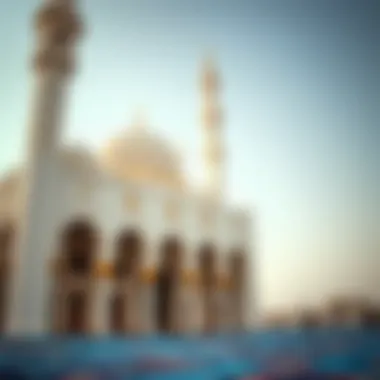
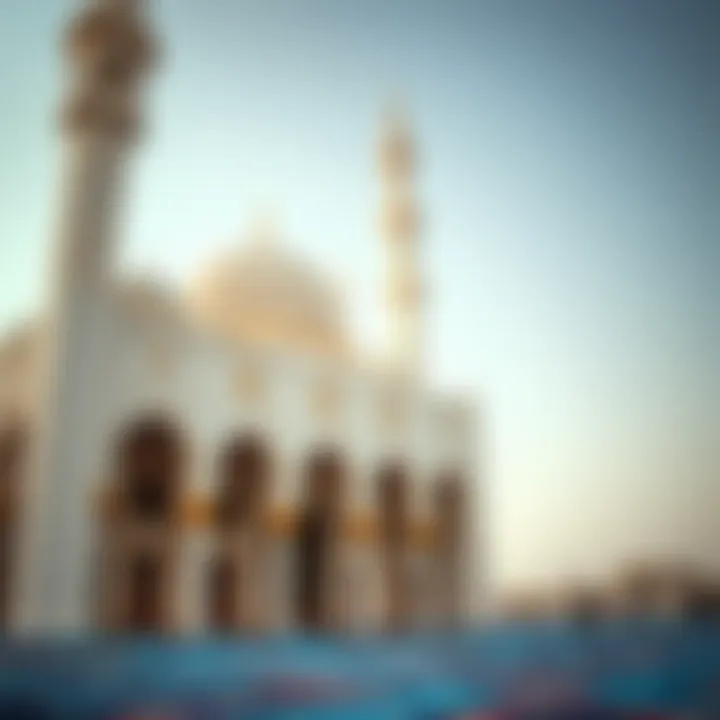
The hospitality sector in the UAE sees a substantial surge during Ramadan, driven by both local patrons and international visitors. Hotels and restaurants gear up for the season, often rolling out unique iftar menus that cater to the cultural nuances of the month. For example, many establishments, from upscale hotels like the Burj Al Arab to local eateries, offer lavish iftar buffets showcasing traditional dishes such as dates, lentil soup, and lamb dishes. This not only draws diners but also enhances the overall experience of cultural immersion.
Additionally, Ramadan is a prime time for staycations, as families opt for local getaways. Hotel occupancy rates tend to spike leading up to Eid al-Fitr, as people seek to celebrate with loved ones. Many hotels also take this opportunity to organize special events, including cultural evenings featuring musical performances and art displays, enriching the guest experience.
There’s an increasing trend toward wellness and spirituality-centric experiences too; some hotels now offer packages that include yoga sessions or meditation practices designed to complement the spiritual reflections of Ramadan.
Effects on Retail and Market Dynamics
Retailers often brace themselves for the unique consumer behavior during Ramadan. There is usually a marked increase in shopping activity, particularly in food and fashion retail. Grocery stores report a surge in sales of food items, especially those favored for iftar meals, while clothing retailers often see an uptick in purchases as people prepare for Eid celebrations.
Additionally, many retailers offer special discounts and promotions during Ramadan, making it an advantageous time for consumers to shop. This is reflected through campaigns and advertisements that focus on family and togetherness themes, resonating well with the spirit of the month.
Online shopping also sees a dramatic rise; consumers enjoy the convenience of purchasing groceries and gifts from the comfort of their homes, especially as they adapt their schedules around fasting hours. E-commerce platforms tend to introduce thematic sales and limited-time offers that attract attention and drive sales.
Moreover, market dynamics shift as businesses consider the timing of their operations. Shops often stay open later into the night to accommodate after-iftar shopping sprees, catering to the busy schedules of many.
"The spike in hospitality and retail activity during Ramadan is not just a seasonal trend; it reflects a deeper cultural resonance, driving economic growth while strengthening community ties."
Real Estate Considerations
The real estate landscape in the UAE undergoes noticeable shifts during Ramadan, reflecting both the cultural and economic impacts of this holy month. Understanding these dynamics is crucial for investors, agents, homebuyers, and managers alike, as they stand to reap the benefits or face challenges depending on their awareness and adaptability to these changes. Ramadan is not merely a period of fasting; it marks a time of heightened social activity and community engagement, which can influence various aspects of property management and rental agreements.
Rental Market Trends during Ramadan
During Ramadan, the rental market in the UAE often sees a mixed bag of activity. On one hand, demand for short-term rentals might surges amidst travelers who wish to experience the festivities firsthand. From families wanting a taste of local culture to expatriates joining friends during Iftar, properties that offer short-term stays can become quite popular.
Here are a few key points about rental market trends:
- Increased Demand for Luxury Accommodations: Many locals and expats prefer to host large gatherings during Iftar, leading to a preference for spacious, well-equipped homes with amenities for entertainment.
- Focus on Family-Oriented Properties: There's often more interest in family-friendly accommodations during this period, as gatherings during Ramadan promote a sense of unity and familial closeness.
- Seasonal Price Adjustments: While some property owners adjust pricing to reflect demand, others might offer deals to entice renters during off-peak times. Being aware of these trends can give both landlords and tenants leverage in negotiations.
"Ramadan is a unique period where community bonds strengthen, influencing many decisions in the housing sector."
Opportunities for Investors
Ramadan can present various opportunities for those looking to invest in real estate. Investors who comprehend the nuances of the season can capitalize on the unique marketplace that emerges during this time.
Some points to consider include:
- Investment in Retail Spaces: As Ramadan sees a surge in community gatherings and shopping activities, investing in rental properties located near popular Iftar spots and marketplaces can be lucrative.
- Focus on Mixed-Use Developments: Properties that integrate residential and leisure components tend to thrive, offering investors a chance to tap into both living and social experiences during Ramadan.
- In-depth Market Analysis: Investors should grasp the specific needs of the community during this month to identify prime opportunities. Understanding cultural preferences can lead to better-targeted investments and avoid costly pitfalls.
Culinary Aspects of Ramadan
Culinary traditions during Ramadan in the UAE play a pivotal role, reflecting the rich tapestry of Emirati culture and the community's values of sharing and generosity. Food is not merely sustenance during this holy month; it becomes a profound symbol of unity, compassion, and family togetherness. As people fast from dawn until sunset, the act of gathering around a table to break the fast transforms into a cherished ritual. Observing the culinary landscape during this period offers insight into both social practices and the region's historical roots.
Traditional Dishes and Sweets
Throughout Ramadan, the selection of traditional dishes and sweets is as diverse as the cultural influences at play. Each Emirati household may have its own take on classic recipes, ensuring that every iftar showcases personal and family traditions.
- Dates and Water: Almost universally, the fast is broken with dates and water. Dates hold significant nutritional value and are a nod to Islamic tradition. They provide quick energy, replenishing sugars after hours without food.
- Harees: A timeless dish made from crushed wheat and meat, harees is a staple during Ramadan. The slow cooking process symbolizes patience and community, as families often gather to prepare it together.
- Shorbat Adas: Lentil soup, particularly enjoyed for its warmth and richness, is another favorite for iftar. Its contents vary; some add spices while others prefer a milder taste, accommodating diverse preferences.
In terms of sweets, Kunafa and Qatayef are prime examples of how cultures merge in culinary delights. Kunafa, a sweet pastry drenched in syrup, is frequently enjoyed after main meals, while Qatayef, a stuffed pancake, often finds its way onto tables as a delightful treat during gatherings.
Dining Experiences During the Month
Dining experiences during Ramadan take on a different hue, moving beyond mere eating to encapsulate ritualistic values of togetherness and reflection. Evening meals carry a sense of urgency, not just due to the anticipation of breaking the fast but also due to how they gather families and friends in celebration.
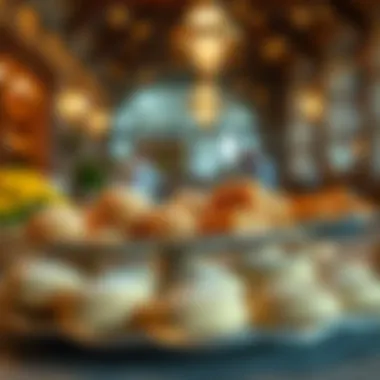
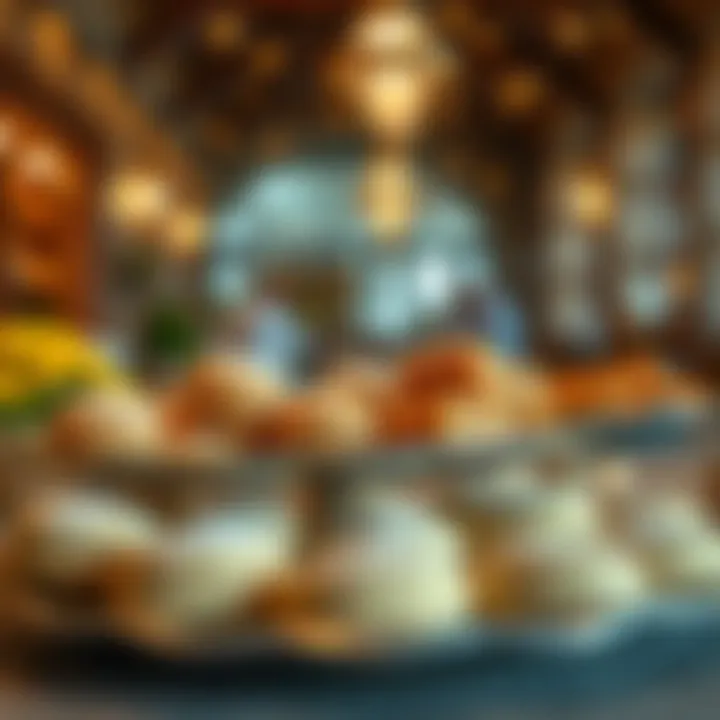
- Nightly Gatherings: Iftar meals are marked by communal gatherings. This is where neighbors, friends, and families unite, sharing not just the food but also laughter, stories, and reflections. The aroma from the kitchens wafts through the air, beckoning all to partake.
- Iftar Buffets: In a twist of culinary indulgence, many hotels and restaurants in the UAE host lavish iftar buffets. These spread across Emirati, Arab, and international cuisines, showcasing the UAE’s multicultural society.
"Food during Ramadan isn't just nourishment; it's an expression of faith and community."
- Storytelling With Food: Often, each dish served comes with a narrative—a link to family stories, memories of childhood, or the essence of the season. The mundane act of eating transforms into a rich tapestry of experiences that enhance the celebration of Ramadan.
Understanding the culinary aspects of Ramadan in the UAE is essential for anyone, especially investors and entrepreneurs looking to tap into the hospitality sector during this solemn month. The unique dining customs and traditional dishes present vast opportunities for businesses catering to cultural sensitivities while delivering memorable experiences to both residents and international visitors.
Tourism and Ramadan
The intersection of tourism and Ramadan in the UAE represents a dynamic cultural tableau. The holy month not only shapes the spiritual landscape of the country but also significantly influences the tourism sector. For investors and stakeholders in the travel industry, understanding this synergy can yield fruitful opportunities.
During Ramadan, many international visitors seek to immerse themselves in authentic Emirati culture. This is often driven by a desire to witness the local traditions, culinary delights, and warm hospitality that define this month. Tourists from various backgrounds arrive, eagerly anticipating the opportunity to experience the sights and sounds of Ramadan firsthand.
Attraction of International Visitors
The influx of tourists during Ramadan can be attributed to several attracting factors:
- Cultural Curiosity: Many travelers are keen to learn about Islamic traditions and how they are observed in a contemporary setting like the UAE. Experiencing Ramadan in the UAE offers an appealing blend of the traditional and modern.
- Culinary Experiences: Ramadan is celebrated with special culinary offerings. Tourists are drawn to the Iftar buffets, where they can indulge in rich flavors and traditional dishes like harees and maamoul, which showcase the region’s heritage.
- Diverse Festivities: Cultural events during Ramadan add another layer of attraction. Events such as Ramadan markets offer local handicrafts, art, and entertainment, providing tourists with unique shopping opportunities.
- Limited Crowds: Many prefer visiting during the off-peak season, which is how Ramadan can be viewed. The bustling summer months give way to a calmer atmosphere, allowing visitors to explore at a leisurely pace.
The combination of these factors not only enhances the experience of the tourists but also promotes cultural understanding and interaction between different communities.
Special Ramadan Events and Festivals
The shift in the social calendar during Ramadan ushers in a plethora of events designed for both locals and tourists. Here are some examples of notable festivities:
- Cultural Programs: Museums and cultural centers often host special programs that explain the significance of Ramadan. Such events include local storytelling, art showcases, and educational workshops related to Islamic art and culture.
- Community Iftars: Hotels and restaurants come together to create communal spaces where everyone is welcome to share in Iftar meals. These gatherings symbolize generosity and hospitality, central to Ramadan's ethos.
- Ramadan Light Festivals: Cities like Dubai and Abu Dhabi organize light displays, projecting intricate designs that celebrate the spirit of the month. These festivals create a magical atmosphere, drawing families and visitors to enjoy the beautiful sights.
- Sports and Health Events: There are sports gatherings promoting health and wellness during Ramadan, such as soccer tournaments that cater to both locals and tourists. Engaging in these activities can encourage healthy living while also being a lot of fun.
In summary, the alignment of tourism with Ramadan provides an engaging backdrop for all visitors to the UAE. The month offers an abundance of opportunities for cultural exchange, culinary delights, and social harmony. For businesses and investors, tapping into this period can be a transformative experience, allowing them to foster deeper connections within the community and enhance the prosperity of the tourism industry in the UAE.
Reflections on Tolerance and Unity
In a region steeped in various traditions and societal philosophies, Ramadan serves as a powerful platform for fostering unity and understanding among diverse communities. This facet of Ramadan is not only about fasting or prayer; it's a vibrant expression of tolerance, reflecting the rich tapestry of cultures in the UAE. During the holy month, differences in belief systems might fade when shared human values take center stage. The emphasis is placed on compassion, kindness, and empathy that transcends religious boundaries and creates bridges for dialogue and respect.
The United Arab Emirates is home to a multitude of nationalities, and Ramadan offers an opportunity for people from diverse backgrounds to come together. It informs us about the importance of cultural exchange, highlighting how observance of Ramadan can build communal bonds. This reflects a collective commitment to understanding one another better, cultivating an environment that places a premium on peace and goodwill.
"In the spirit of Ramadan, tolerance becomes more than just a concept; it becomes a shared journey among communities."
Interfaith Observances
Interfaith observances during Ramadan represent a unique aspect of community life in the UAE. Various cultural organizations and religious bodies come together to promote understanding and respect, laying the groundwork for cooperation.
- Charity Events: Many interfaith gatherings are centered around charitable activities. Members from different religions join forces to organize food drives, educational seminars, and volunteer activities which not only support those in need but also strengthen inter-religious connections.
- Open Iftar Events: One increasingly popular event is the Open Iftar, where individuals from various faiths are invited to break their fast together. These occasions encourage dialogue, allowing participants to share traditions and swap stories.
- Cultural Workshops: Often during Ramadan, cultural workshops are organized. They focus on sharing prayers, food, and history, inviting individuals to learn about other faiths, enriching their own understanding through shared narratives.
Such events showcase that although people may have different beliefs, the essence of humanity is shared, irrespective of one's faith.
Cultural Integration during Ramadan
Cultural integration during Ramadan becomes palpable in the lively interactions that characterize the month. Residents and visitors alike partake in festive activities, celebrating the spirituality of Ramadan while enjoying the amalgamation of cultures.
- Shared Meals: Shared meals, particularly during Iftar, illustrate the spirit of unity. Whether dining at a local Arabic restaurant or partaking in a potluck-style gathering, the experience fosters a sense of belonging that goes beyond mere culinary enjoyment.
- Festival Participation: Events like Ramadan Nights include cultural performances, art exhibitions, and bazaars. These gatherings invite members of all backgrounds to celebrate together. Participating in such events not only enriches one’s understanding of local customs but also promotes enduring friendships across cultures.
- Art and Music: Festivals often showcase traditional music and art forms which portray heritage and contemporary expressions of faith. Collaborations between different cultural groups create an artistic dialogue that resonates well beyond the month.
The End
The essence of Ramadan in the modern United Arab Emirates extends beyond mere rituals; it encapsulates a holistic approach to community, spirituality, and cultural identity. As this article illustrates, the significance of Ramadan is woven intricately into the fabric of Emirati society. This period is not just about fasting and prayer, but also about fostering connections among people, cultivating a spirit of giving, and engaging in collective joy.
Significance of Ramadan in Modern UAE
- Cultural Identity: For Emiratis, Ramadan represents a reaffirmation of their cultural and religious identity. It is a time when the populace unites in shared practices, reinforcing a sense of belonging and collective memory. The observance acts as a reminder of the core values of respect, tolerance, and community that define the Emirati way of life.
- Economic Influence: Ramadan significantly influences economic activities in the UAE. From skyrocketing demand in the hospitality sector to vibrant night markets and Ramadan-themed events, the month reshapes consumer behavior. Businesses adapt their strategies, catering to the unique needs of customers who seek special experiences during Iftar and Suhoor.
- Social Cohesion: The month is marked by increased acts of charity, community events, and interfaith dialogues. This creates an environment where diverse cultures and faiths come together, exemplifying the UAE’s commitment to tolerance and harmony. The community responsiveness during Ramadan fosters deeper connections, encouraging an atmosphere of understanding and mutual respect.
- Educational Opportunities: Ramadan also serves as a time for learning and reflection. Many organizations and institutions introduce programs that promote awareness of Islamic teachings and encourage the spirit of giving, especially to those less fortunate. This educative approach underscores the transformative power of Ramadan in shaping attitudes towards philanthropy and social responsibility.
- Personal Growth: On a personal level, the observance of Ramadan offers individuals a chance for introspection and self-improvement. It encourages mindfulness about one's actions and thoughts, promoting personal health and wellbeing alongside spiritual enrichment. The month thus transforms into a period of positive change and energy redirecting one’s focus towards better living and cooperation.
In summary, Ramadan is a compelling period that holds a mirror to the values cherished by Emiratis. The continuity of these practices in modern society fortifies cultural heritage while adapting to contemporary dynamics. The month serves not only as a time for prayer and reflection but as a conduit for promoting understanding, fostering community, and stimulating the economy. Recognizing these aspects can significantly enhance the perspective of investors, agents, homebuyers, and managers, allowing them to appreciate the broader context of Ramadan's impact on the landscape of the UAE.
Ramadan isn't merely a holy month; it's a cornerstone of the social and cultural identity that binds the people of the UAE together.







